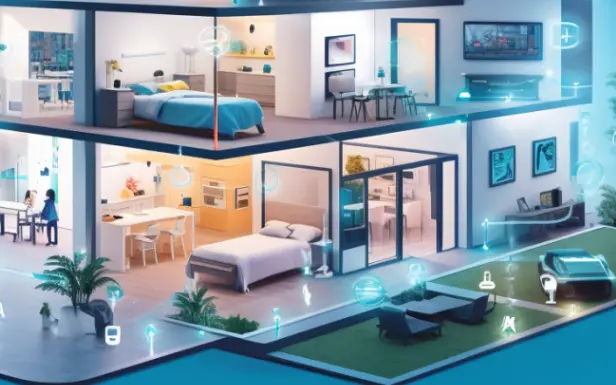
AI-powered smart homes are revolutionizing modern living with predictive automation, adjusting lighting, temperature, and security settings based on user behavior
AI-Powered Smart Homes- The future of home automation is here, and AI-powered smart homes are transforming the way we live. With predictive automation, smart home assistants can now anticipate user needs, adjusting lighting, temperature, and security settings based on behavioral patterns. This seamless integration of AI and IoT is making homes more efficient, immersive, and intelligent than ever before.
From energy-saving smart thermostats to AI-driven security systems, the latest advancements in home automation are setting new benchmarks for comfort, convenience, and sustainability. Let’s explore how AI-powered smart homes are reshaping industries and redefining modern living.
The Rise of AI-Powered Smart Homes
What is Predictive Automation?
Predictive automation uses machine learning algorithms to analyze user behavior, allowing smart home devices to anticipate actions before they happen. Unlike traditional automation, which requires manual input, predictive AI can:
- Adjust room temperature based on daily habits.
- Dim lights automatically when bedtime approaches.
- Lock doors and activate security systems when residents leave home.
How AI Enhances Smart Home Efficiency
AI-driven smart homes are not just reactive—they’re proactive. By learning from historical data, AI-powered assistants can:
- Optimize energy consumption, reducing electricity bills.
- Enhance security with real-time threat detection.
- Improve convenience, making daily routines effortless.
Key Features of AI-Powered Smart Homes
1. Smart Lighting Systems
AI-powered lighting solutions adjust brightness and color temperature based on:
- Time of day (warmer tones in the evening, cooler tones in the morning).
- User preferences (customized ambiance settings).
- Motion detection (lights turn on when someone enters a room).
2. AI-Driven Climate Control
Smart thermostats like Google Nest and Ecobee use AI algorithms to:
- Learn user preferences and adjust temperatures accordingly.
- Optimize energy usage, reducing carbon footprints.
- Integrate with weather forecasts for real-time climate adjustments.
3. Advanced Security & Surveillance
AI-powered security systems offer:
- Facial recognition for personalized access control.
- Predictive threat detection, identifying unusual activity.
- Automated emergency alerts, notifying homeowners instantly.
4. AI-Integrated Home Assistants
Voice-controlled assistants like Amazon Alexa, Google Assistant, and Apple Siri are evolving with:
- Conversational AI, making interactions more natural.
- Multi-device synchronization, ensuring seamless connectivity.
- Personalized recommendations, enhancing user experience.
5. Energy Management & Sustainability
AI-driven energy management systems:
- Monitor electricity consumption and suggest optimizations.
- Integrate with solar panels for sustainable power solutions.
- Enable peer-to-peer energy trading, reducing dependency on grids.
The Future of AI-Powered Smart Homes
1. AI-Enhanced Predictive Maintenance
Smart appliances now feature predictive maintenance, detecting issues before they escalate. This helps homeowners:
- Avoid costly repairs by addressing problems early.
- Schedule maintenance proactively, reducing downtime.
- Improve appliance longevity, ensuring long-term efficiency.
2. AI in Home Entertainment
AI is revolutionizing home entertainment with:
- Personalized content recommendations on smart TVs.
- Voice-controlled gaming experiences for immersive interactions.
- AI-driven sound systems, adapting audio settings dynamically.
3. AI-Powered Smart Kitchens
Future kitchens will feature:
- Automated grocery ordering, based on consumption patterns.
- AI-driven cooking assistants, guiding users through recipes.
- Smart refrigerators, tracking food expiration dates.
Conclusion
AI-powered smart homes are reshaping modern living, offering unmatched convenience, security, and efficiency. With predictive automation, homes are becoming more intuitive, adapting to user needs without manual intervention. As AI continues to evolve, the future of home automation promises greater sustainability, personalization, and innovation.
Stay updated with the latest news on Rapido Updates. Keep yourself updated with The World, India News, Entertainment, Market, Gadgets, Sports, and many more
1 thought on “AI-Powered Smart Homes: How Predictive Automation is Revolutionizing Modern Living”